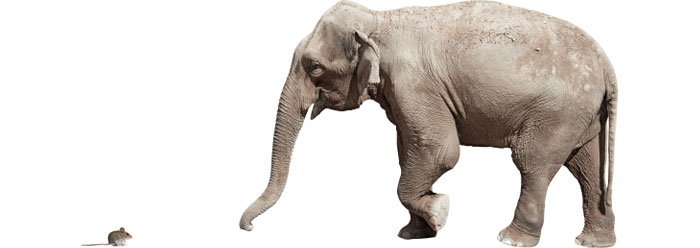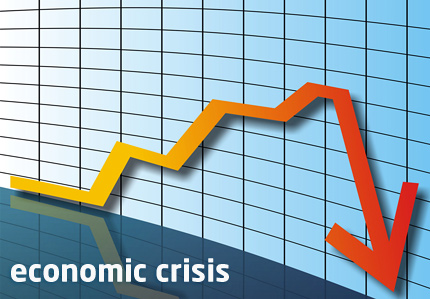In a recent post, we discussed research that demonstrated that when women are faced with competition for mates, they tend to respond by spending more money on appearance-enhancing products (i.e., clothes and cosmetics). This research partly explained the phenomenon seen as long ago as the 1920s, that in down economic times (i.e., when there are fewer high status males) sales of cosmetics — not one of life’s necessities — increased rather than decreased.
Today’s post concerns a more general — and unfortunate — finding from the research on how we react to bad economic times.

The mouse and the elephant are prototypical fast (mouse) and slow (elephant) life strategy animals
First, a brief introduction. Biologists have long used Life History Theory to explain the different reproductive strategies animals use. There are two basic strategies, fast and slow. The fast strategy involves having as many offspring as possible at a young age. This strategy minimizes the investment any one animal makes in its own and its off-spring’s physical development. Think of insects, small mammals, etc, that have lots and lots of offspring, but don’t spend much energy nurturing them. This is a good strategy when being alive tomorrow is really uncertain. On the other hand, we have animals like humans, elephants, whales and other typically larger animals that spend a great deal of resource growing before becoming sexually mature, then spend a great deal of resource nurturing their young. Only animals that have a good chance of living long lives can afford such a strategy. This is the slow reproductive strategy.
A key aspect of life history theory is this: the lower the odds are of an animal reaching sexual maturity, the faster will be its reproductive strategy. Life history explains the difference in reproductive strategies between animals with long versus short lives. It has been shown to operate in the realm of human lifetimes, as well. Research by Vlad Griskevicius and colleagues has demonstrated that children raised in harsh and uncertain environments (e.g., poverty, abuse, war) tend to adopt faster life strategies than children raised in more secure environments. Fast-strategy children grow up to be more impulsive, take more health risks, and have sex and children at an earlier age.
One of the key findings in the life history research involving people is that these differences in strategy tend to be expressed more (and often only) when people are under threat. So, for instance, when people are confronted with loss of work and income, people with different life histories may be expected to respond differently. In their most recent study, this is what Griskevicius and colleagues tested.
When “primed” with (reminded, made to think about) threats to their financial wellbeing, people who were poorer as children were more likely to respond by making more impulsive, riskier choices than usual, whereas people from more secure backgrounds did the opposite.
It is interesting to note that in the past, one criticism of life history research with people is that actual childhood economic status might not mean a person felt insecure or unsafe as a child. Many people raised in objectively “poor” environments report having had a happy childhood, some even being unaware of their relative poverty. To overcome this legitimate concern, the researchers used a biological marker of childhood insecurity — oxidative stress — to determine which participants had had stressful, fast-strategy childhoods. Childhood stress and the hormones that stress causes to be released leave tell-tale traces that are still visible in adults, and these traces can be divined through a simple urine analysis. Whether measured by asking about childhood income or by measuring oxidative stress, childhood stress is related to spending rather than saving when faced with financial threats as an adult.

The research suggests that people who grew up feeling stressed are likely to react to recessionary times differently from people who grew up in comfortable environments.
Now, it is possible that people who choose riskier, more impulsive behavior when they hear of a looming recession will be more successful than those who behave in a more thoughtful manner. But, all things being equal, it seems unlikely.
This blog post was written by Kerry Cunningham. Follow @kerryfc
At BeyondThePurchase.Org we are researching the connection between people’s spending habits, happiness, and values. To learn about your spending habits, what influences your buying behavior, and how you define the good life, first Login or Register with Beyond The Purchase, then take our Materialistic Values Scale, our Consumer Susceptibility to Interpersonal Influence Scale, and our Beliefs about Well-being. We think you may learn a lot about what causes you to part with your hard-earned money.
The article referenced above is called, “When the Economy Falters Do People Spend or Save? Responses to Resource Scarcity Depend on Childhood Environments,” and will appear in a forthcoming issue of Psychological Science.

